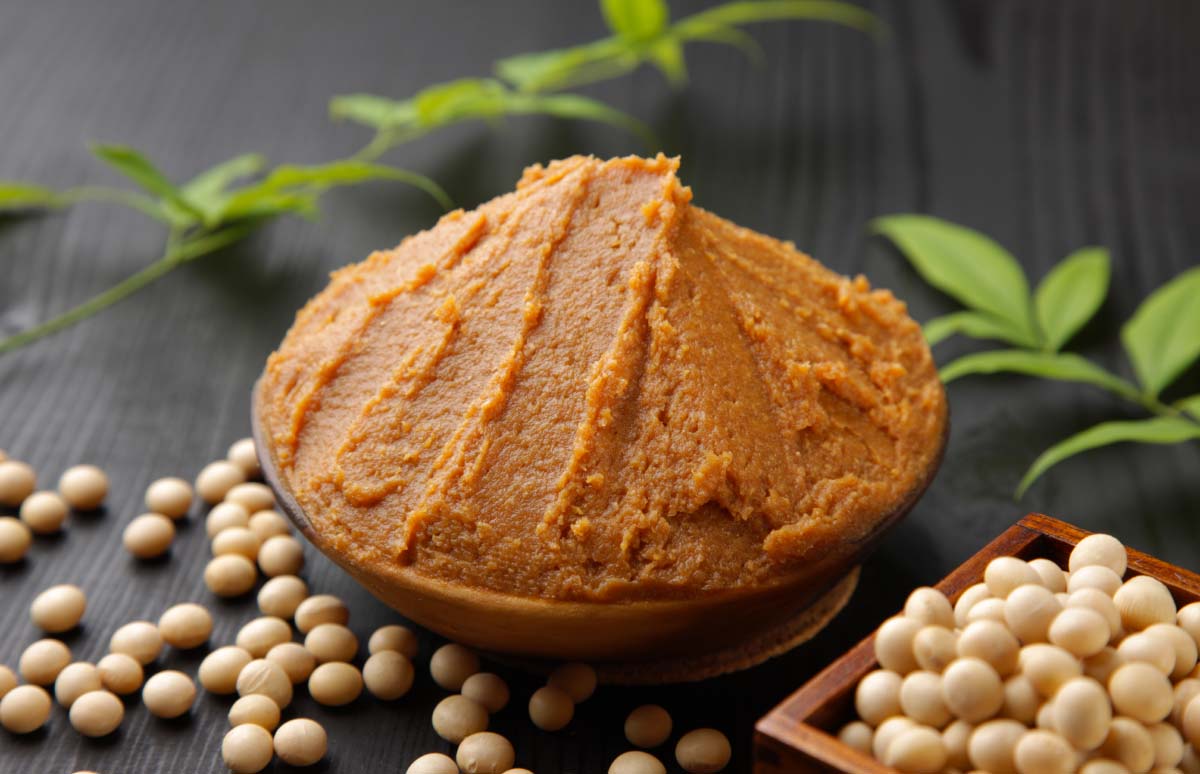Miso: A Superfood with Beneficial Properities for Your Well-Being
Can individuals incorporate miso into their diets to improve their gut health and utilize its beneficial properties?
What Is Miso?
As the weather starts to get colder, many people start thinking about making soups, stews, and hot foods. However, when it comes to a person’s health and wellness, many people wonder what to add to their soups while adding many nutritional foods and proteins that can make them not only flavorful but also add beneficial properties to their diet. Why not add miso? Miso is fermented soybean paste, a rice-based food product in Japan that is a staple cooking product. (Saeed et al., 2022) Additionally, since miso is a soybean product, many people incorporate it into their soups as it contributes to many health benefits to Japanese-style diets and can even enhance various dishes. (Ito, 2020) At the same time, many people who start to incorporate miso as part of their diet will notice some beneficial results in their gut system. We associate with certified medical providers who inform our patients of the benefits of incorporating miso into a nutritional diet. While asking important questions to our associated medical providers, we advise patients to integrate ways to add miso to their foods and help reduce bad bacterial growth in their gut system. Dr. Alex Jimenez, D.C., envisions this information as an academic service. Disclaimer.
Types Of Miso
Miso can come in various types depending on how long it has been left to be fermented and its ingredients to see what color and flavor intensity will be put into the cooking. All miso products are in paste form and can be paired well with any protein like chicken, meat, and fish. The types of miso include:
- White miso (Shiro miso): Mildest, sweet, less salty
- Yellow miso (Shinshu miso): Mild, earthier, more acidic
- Red miso (Aka miso): Salty, slightly bitter
- Brown rice miso (Genmai miso): Sweet, mild, earthy
- Barley miso (Mugi miso): Mild, earthy, not gluten-free
Miso Nutritional Facts
When it comes to the nutritional facts of miso, one tablespoon of miso contains about:
- 1 tbsp of miso: 17g
- Calories: 34
- Total Fats: 1g
- Cholesterol: 0mg
- Sodium: 634mg
- Total Carbohydrates: 4.3g
- Protein: 2.2g
It is important to note that a bit of miso goes a long way due to its high sodium content and its various vitamins and nutrients.
Eat Right To Feel Better- Video
Beneficial Properties of Miso
When it comes to the beneficial properties of miso, it has numerous benefits that can help the body provide the nutrients it needs to fuel. Since miso is a fermented seasoning, it is rich in nutrients and has probiotic microorganisms that can help propagate healthy good bacteria to the gut while enhancing the immune system. (Paul et al., 2023) Additionally, when consumed daily, miso can help improve skin moisture, stimulate ceramides, have an anti-hypertensive effect, and many other beneficial effects. (Kotake et al., 2022)
Improves Gut Health
Since miso is a probiotic, it can help many individuals with gut issues since the gut system has trillions of bacteria that activate and mediate the body. (de Vos et al., 2022) Many people don’t realize that the gut is known as the second brain, and when environmental factors start to affect the gut, it can cause many health problems. So, adding miso can help influence good bacteria to reduce harmful bacteria and directly influence the epithelial immune cells of the GI tract. (Wieers et al., 2019)
Incorporating Miso In Your Diet
Since miso has a sweet/salty flavor, it can be used in various recipes. It can be taken in small amounts depending on the individual’s taste and what ingredients many people use for their cooking. At the same time, if a person is on a low-sodium diet, limiting the intake or avoiding it if they have a food allergy to soy is best. Making small changes and adding healthy nutritional substitutes to food can help many people live healthier.
References
de Vos, W. M., Tilg, H., Van Hul, M., & Cani, P. D. (2022). Gut microbiome and health: mechanistic insights. Gut, 71(5), 1020-1032. https://doi.org/10.1136/gutjnl-2021-326789
Ito, K. (2020). Review of the health benefits of habitual consumption of miso soup: focus on the effects on sympathetic nerve activity, blood pressure, and heart rate. Environ Health Prev Med, 25(1), 45. https://doi.org/10.1186/s12199-020-00883-4
Kotake, K., Kumazawa, T., Nakamura, K., Shimizu, Y., Ayabe, T., & Adachi, T. (2022). Ingestion of miso regulates immunological robustness in mice. PLOS ONE, 17(1), e0261680. https://doi.org/10.1371/journal.pone.0261680
Paul, A. K., Lim, C. L., Apu, M. A. I., Dolma, K. G., Gupta, M., de Lourdes Pereira, M., Wilairatana, P., Rahmatullah, M., Wiart, C., & Nissapatorn, V. (2023). Are Fermented Foods Effective against Inflammatory Diseases? Int J Environ Res Public Health, 20(3). https://doi.org/10.3390/ijerph20032481
Saeed, F., Afzaal, M., Shah, Y. A., Khan, M. H., Hussain, M., Ikram, A., Ateeq, H., Noman, M., Saewan, S. A., & Khashroum, A. O. (2022). Miso: A traditional nutritious & health-endorsing fermented product. Food Sci Nutr, 10(12), 4103-4111. https://doi.org/10.1002/fsn3.3029
Wieers, G., Belkhir, L., Enaud, R., Leclercq, S., Philippart de Foy, J. M., Dequenne, I., de Timary, P., & Cani, P. D. (2019). How Probiotics Affect the Microbiota. Front Cell Infect Microbiol, 9, 454. https://doi.org/10.3389/fcimb.2019.00454
Disclaimer
Post Disclaimer
General Disclaimer, Licenses and Board Certifications *
Professional Scope of Practice *
The information herein on "Miso: A Superfood with Beneficial Properities for Your Well-Being" is not intended to replace a one-on-one relationship with a qualified health care professional or licensed physician and is not medical advice. We encourage you to make healthcare decisions based on your research and partnership with a qualified healthcare professional.
Blog Information & Scope Discussions
Welcome to El Paso's Premier Wellness and Injury Care Clinic & Wellness Blog, where Dr. Alex Jimenez, DC, FNP-C, a Multi-State board-certified Family Practice Nurse Practitioner (FNP-BC) and Chiropractor (DC), presents insights on how our multidisciplinary team is dedicated to holistic healing and personalized care. Our practice aligns with evidence-based treatment protocols inspired by integrative medicine principles, similar to those on this site and on our family practice-based chiromed.com site, focusing on naturally restoring health for patients of all ages.
Our areas of multidisciplinary practice include Wellness & Nutrition, Chronic Pain, Personal Injury, Auto Accident Care, Work Injuries, Back Injury, Low Back Pain, Neck Pain, Migraine Headaches, Sports Injuries, Severe Sciatica, Scoliosis, Complex Herniated Discs, Fibromyalgia, Chronic Pain, Complex Injuries, Stress Management, Functional Medicine Treatments, and in-scope care protocols.
Our information scope is multidisciplinary, focusing on musculoskeletal and physical medicine, wellness, contributing etiological viscerosomatic disturbances within clinical presentations, associated somato-visceral reflex clinical dynamics, subluxation complexes, sensitive health issues, and functional medicine articles, topics, and discussions.
We provide and facilitate clinical collaboration with specialists across disciplines. Each specialist is governed by their professional scope of practice and licensure jurisdiction. We use functional health & wellness protocols to treat and support care for musculoskeletal injuries or disorders.
Our videos, posts, topics, and insights address clinical matters and issues that are directly or indirectly related to our clinical scope of practice.
Our office has made a reasonable effort to provide supportive citations and has identified relevant research studies that support our posts. We provide copies of supporting research studies upon request to regulatory boards and the public.
We understand that we cover matters that require an additional explanation of how they may assist in a particular care plan or treatment protocol; therefore, to discuss the subject matter above further, please feel free to ask Dr. Alex Jimenez, DC, APRN, FNP-BC, or contact us at 915-850-0900.
We are here to help you and your family.
Blessings
Dr. Alex Jimenez DC, MSACP, APRN, FNP-BC*, CCST, IFMCP, CFMP, ATN
email: [email protected]
Multidisciplinary Licensing & Board Certifications:
Licensed as a Doctor of Chiropractic (DC) in Texas & New Mexico*
Texas DC License #: TX5807, Verified: TX5807
New Mexico DC License #: NM-DC2182, Verified: NM-DC2182
Multi-State Advanced Practice Registered Nurse (APRN*) in Texas & Multi-States
Multi-state Compact APRN License by Endorsement (42 States)
Texas APRN License #: 1191402, Verified: 1191402 *
Florida APRN License #: 11043890, Verified: APRN11043890 *
Colorado License #: C-APN.0105610-C-NP, Verified: C-APN.0105610-C-NP
New York License #: N25929, Verified N25929
License Verification Link: Nursys License Verifier
* Prescriptive Authority Authorized
ANCC FNP-BC: Board Certified Nurse Practitioner*
Compact Status: Multi-State License: Authorized to Practice in 40 States*
Graduate with Honors: ICHS: MSN-FNP (Family Nurse Practitioner Program)
Degree Granted. Master's in Family Practice MSN Diploma (Cum Laude)
Dr. Alex Jimenez, DC, APRN, FNP-BC*, CFMP, IFMCP, ATN, CCST
My Digital Business Card
Licenses and Board Certifications:
DC: Doctor of Chiropractic
APRN: Advanced Practice Registered Nurse
FNP-BC: Family Practice Specialization (Multi-State Board Certified)
RN: Registered Nurse (Multi-State Compact License)
CFMP: Certified Functional Medicine Provider
MSN-FNP: Master of Science in Family Practice Medicine
MSACP: Master of Science in Advanced Clinical Practice
IFMCP: Institute of Functional Medicine
CCST: Certified Chiropractic Spinal Trauma
ATN: Advanced Translational Neutrogenomics
Memberships & Associations:
TCA: Texas Chiropractic Association: Member ID: 104311
AANP: American Association of Nurse Practitioners: Member ID: 2198960
ANA: American Nurse Association: Member ID: 06458222 (District TX01)
TNA: Texas Nurse Association: Member ID: 06458222
NPI: 1205907805
| Primary Taxonomy | Selected Taxonomy | State | License Number |
|---|---|---|---|
| No | 111N00000X - Chiropractor | NM | DC2182 |
| Yes | 111N00000X - Chiropractor | TX | DC5807 |
| Yes | 363LF0000X - Nurse Practitioner - Family | TX | 1191402 |
| Yes | 363LF0000X - Nurse Practitioner - Family | FL | 11043890 |
| Yes | 363LF0000X - Nurse Practitioner - Family | CO | C-APN.0105610-C-NP |
| Yes | 363LF0000X - Nurse Practitioner - Family | NY | N25929 |
Dr. Alex Jimenez, DC, APRN, FNP-BC*, CFMP, IFMCP, ATN, CCST
My Digital Business Card


